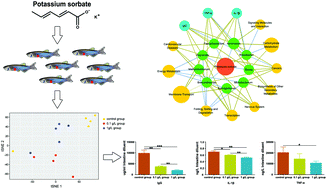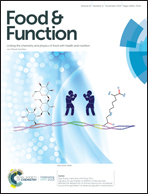Potassium sorbate suppresses intestinal microbial activity and triggers immune regulation in zebrafish (Danio rerio)†
Abstract
Potassium sorbate (PS) is a class of bacteriostatic antiseptic agent widely used in the food industry; the effects of its intake on host health are currently unclear. In the present study, zebrafish (Danio rerio) were exposed to 0.1 g L−1 and 1 g L−1 aqueous solutions of PS for 2 weeks to investigate the impact of PS on the microecological balance of the intestinal microbiota and immune system. PS exposure triggered immune regulation of zebrafish, significantly reducing the content of diverse biomarkers in the gut, including Immunoglobulin G (IgG), interleukin-1β (IL-1β) and tumor necrosis factor-α (TNF-α). Based on high-throughput sequencing data, it was observed that PS exposure resulted in some destabilization of the microbiome composition of the zebrafish, which mainly manifested as a reduction in the abundance of specific genera and the relative levels of transcription and carbohydrate metabolism related to microbial reproductive ability and activity. These changes were consistent with the activity index of microbiota (AIM), a novel measure that we constructed. Collectively, these results illustrate that PS can affect the immune system of zebrafish by changing the composition and function of the gut microbiota, and inhibiting the metabolism of the intestinal microbiota. Our study offers a new understanding of the toxicity of PS.



 Please wait while we load your content...
Please wait while we load your content...